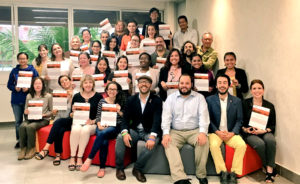 The sixth edition of the workshop Reach and Turn, which took place from October 17 to 19, organized by the United Nations University, together with the City of Knowledge Foundation and the National Secretariat of Science, Technology and Innovation of Panama, and with the support of UNESCO, was one of the parallel events that took place at CILAC.
The sixth edition of the workshop Reach and Turn, which took place from October 17 to 19, organized by the United Nations University, together with the City of Knowledge Foundation and the National Secretariat of Science, Technology and Innovation of Panama, and with the support of UNESCO, was one of the parallel events that took place at CILAC.
The workshop sought to provide its participants with a global vision of the importance of scientific communication and the tools to begin practicing it in their daily work. In this edition in Panama City, and within the framework of Science Week, the importance of social networks as a tool to disseminate scientific advances was highlighted, and the challenges of the Latin American and Caribbean region were discussed in subject of scientific communication.
The Director of the UNESCO Regional Science Office for Latin America and the Caribbean, Lidia Brito, participated in the opening of the workshop, highlighting that: “Having this workshop days before CILAC begins is of utmost importance, because part of the work of CILAC and its central objective is to guarantee that the advancement of science, technology and innovation are at the service of the community, and that there is an interaction between science and the community."
Nearly 50 participants from more than 7 countries were present at this edition of Reach and Turn, which proposed a horizontal dialogue between all of them. Journalists, politicians, communicators, members of the UN and the United Nations University were part of this activity, days before CILAC.
Some of the topics of debate were: the importance of disseminating science today, or how to adequately communicate science with limited resources. Rella Rosenhain and Professor Carlos Cadena Gaitan were the ones who addressed this last topic. The importance of developing networks to generate support and support was one of the most evident conclusions.
Several of the members of UNI Merit, in addition to providing the workshop, were panelists in various CILAC thematic sessions. For example, Professor Cadena Gaitan was part of the panel on the role that science, technology and innovation should play in the creation of smart cities. Doctor Iván Galindo participated in the round table on the bioeconomy in Latin America and the Caribbean, and Shuan SandreGhazi, from UNU-Merit, presented his research in the session on risk, investment and new business models.
